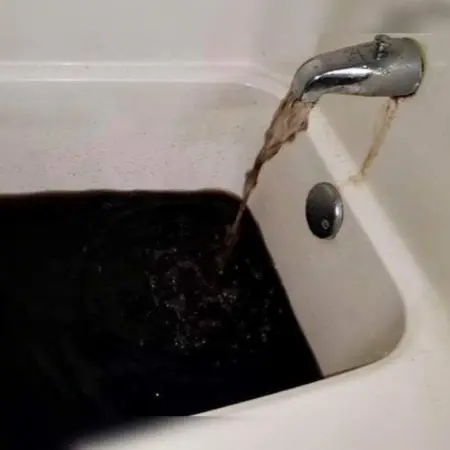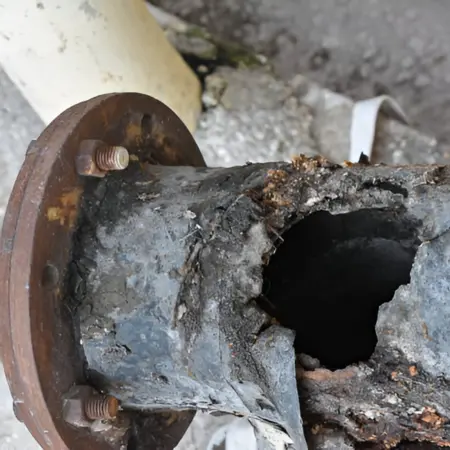Finding black water from your faucet can be alarming, but it’s usually fixable.
Black water in faucets is typically caused by rust, debris, or old pipes.
This guide explores the common reasons behind black water and simple ways to fix it.
Key Takeaways
- Sediment, corroded pipes, and bacteria can cause black water.
- Old, rusty pipes can release rust into the water, making it black.
- Bacteria, like iron bacteria, can cause slimy black water.
- Issues with the water supply, like repairs, can also cause black water.
- Flushing your pipes can help clear out sediment and fix discolored water.
- Replacing old, rusty pipes stops black water from coming out of faucets.
- Regularly check and clean your pipes to prevent black water.
- Test your water quality often to catch problems early and keep it clean.
Common Causes Of Black Water In Faucets
Black water from your faucet can be a surprising problem, but it’s usually fixable.
Several things can cause this, like sediment buildup and corroded pipes.
Here, explore the common reasons for black water.
1. Sediment Buildup In Pipes
Sediment buildup occurs when minerals, like dirt and rust, collect in your pipes.
This happens gradually over time.
It is common in areas with hard water.
When the water flows through the pipes, it can trigger the sediment.
This causes the water to turn black and cloudy.
You might also notice low water pressure and rusty water.
To check for sediment buildup, try running water from different faucets.
If the water is still discolored, your pipes may need cleaning to remove the buildup.

2. Corroded Pipes
Old and corroded pipes are another cause of black water.
As pipes age, they can rust and break down.
This rust mixes with the water, causing it to appear black or brown.
This is especially true for older steel and cast iron pipes.
If your home has old pipes, look for signs of leaks and rust spots.
Replacing and repairing corroded pipes is the best solution.
It will stop the black water from coming out of your faucets.
3. Bacterial Growth Or Slime (Mud)
Black water can also be caused by bacteria and slime growing in your pipes.
Iron bacteria, for example, grow in water with high iron levels.
These bacteria form a slimy, black substance that mixes with the water, making it look dirty.
You may notice a slimy film in your faucets and pipes and smell unpleasant odors.
This type of bacteria is usually not harmful but can affect the taste and quality of your water.
Cleaning your pipes and using antibacterial treatments can help fix this problem.
4. Problems With The Water Supply
Sometimes, black water comes from the water supply itself.
Issues at the water treatment plant, like maintenance work, can cause problems.
This may lead to discolored tap water.
During repairs or high water demand, debris can get triggered in the water supply.
This can cause the water to turn black and brown.
If you notice this, contact your local water authority to see if there are any known problems in your area.
Usually, these issues are temporary and are fixed quickly by the water supply company.

How To Fix Black Water Issues
If you’re dealing with black water, there are a few ways to fix it.
From flushing pipes to calling a plumber, here’s how to solve the problem.
1. Flushing The Pipes
Flushing your pipes is a simple way to fix black water.
Turn on all the faucets in your home and let the water run for a few minutes.
Start with the faucet farthest from the water supply and work to the closest one.
This will help clear out sediment and rust from the pipes.
If the water stays black after flushing, it’s time to call a professional for a more thorough cleaning.
2. Replacing Old Or Damaged Pipes
Old or damaged pipes might cause black water.
Look for signs like rust spots, leaks, and water that won’t clear up.
If your pipes are made of steel and cast iron, they can rust and release particles into the water.
Replacing these pipes with newer materials, like PVC, will stop the black water.
New pipes will also help improve water flow and quality.
3. Installing Water Filtration Systems
Installing a water filtration system is another way to fix black water.
Filters can remove rust, dirt, and bacteria from your water.
You can choose from carbon filters and reverse osmosis (absorbent) systems.
A good filter will clean the water before it comes out of the faucet, helping to prevent black or cloudy water.
4. Calling A Professional Plumber
If flushing the pipes and installing a filter doesn’t work, you may need a professional plumber.
Plumbers have the tools and knowledge to find and fix bigger problems.
They can check your pipes with a camera to see what’s causing the black water.
If the issue is serious, a plumber can replace the pipes.
They can also install a better filtration system to fix the problem.
Contact us at OP Plumbing Hub for excellent and high-quality services.
How To Prevent Black Water In The Future
Regular maintenance is key to keeping black water from coming back.
Here are three simple steps to prevent the problem in the future.

1. Regular Pipe Maintenance Tips
To prevent black water, it’s important to maintain your pipes regularly.
Check for leaks and rust spots, especially in older pipes.
Cleaning your pipes once a year can help remove dirt buildup.
This keeps the water flowing smoothly and prevents discoloration.
2. Importance Of Water Quality Checks
Regular water quality checks can catch problems before they start.
Test your water for things like iron and bacteria that can cause discoloration.
You can use water test kits or have a professional check the water quality.
Early detection can save you from bigger issues later.
3. Installing Water Softeners Or Filters
Installing a water softener or filter can help keep black water away.
A water softener reduces minerals like iron that can cause buildup in your pipes.
Filters can remove impurities from your water, improving its quality.
Both options can prevent dirt and rust from entering your system, keeping your water clean.
Conclusion
This article discusses common causes of black water and solutions for it.
If it doesn’t improve, a plumber can help solve the issue.
Furthermore, how you can prevent it in the future has been discussed. Contact us at OP Plumbing Hub for expert help.
